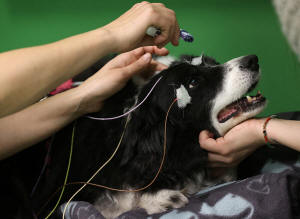Dogs can associate words with objects, study finds
 Send a link to a friend
Send a link to a friend
[April 01, 2024]
By Krisztina Fenyo
BUDAPEST (Reuters) - Dogs are able to understand that some words refer
to objects in a way that is similar to humans, a small study of canine
brain waves has found, offering insight into the way the minds of man's
best friends work.
That our four-legged companions are able to recognize words that prompt
actions will come as no surprise to dog owners who tell their pets to
"sit" or "fetch". |

Researcher Marianna Boros puts electroencephalography (EEG) electrodes
on Rohan, a 12-year-old Border Collie, during a test that found dogs can
associate words with objects, at the Ethology Department of the Eotvos
Lorand University in Budapest, Hungary, March 27, 2024. REUTERS/Bernadett
Szabo |
|
However, the study, which analyzed brain activity in 18 dogs,
provided evidence that they can activate a memory of an object
when they hear its name. The study was carried out at the Eotvos
Lorand University in Budapest and published in the journal
Current Biology.
"There has been a long debate on a non-human animal's ability to
understand words referentially," said Marianna Boros who
co-authored the study.
"While there have been behavioral reports, these were always
exceptional cases. Our study is the first where we claim that
this is a species-wide capacity."
During the study, dog owners said words for objects their pets
knew. Then in some cases they would present the dog with an
object that matched the word, while in other cases the object
didn't match.
The results found that the patterns in the dogs' brains when the
words matched the objects were different compared to when they
didn't. This is similar to what can be observed in humans.
"Dogs can understand that words stand for things... So they
activate mental representations and they link the meaning of the
word to a mental representation and not just the context," said
Boros.
The researchers plan to examine if this ability to understand
referential language is specific to dogs or might be present in
other mammals as well.
Reporting by Krisztina Fenyo; Writing by Alan Charlish; Editing
by Edwina Gibbs)
[© 2024 Thomson Reuters. All rights
reserved.]
Copyright 2022 Reuters. All rights reserved. This material may
not be published, broadcast, rewritten or redistributed.
Thompson Reuters is solely responsible for this content.

|
|
|




